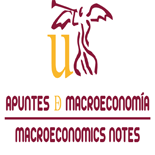
Consumption is the demand for goods and services made by households and represents around 60% of GDP, making it the quantitatively most important component of the DA. There are several factors that affect household consumption.
Household consumption changes as their disposable income changes. In general, when household disposable income increases, families increase their consumption. In turn, if their disposable income decreases, they tend to reduce their consumption. Thus, a functional relationship is observed between consumption and disposable income, with the consumption function describing the relationship between the two variables.
2.1. The Keynesian consumption function in a simple economy
2.2. Aggregate demand in a simple economy
2.3. Equilibrium in a simple economy
2.4. The relationship between consumption, saving and investment in a simple economy
2.5. The multiplier in a simple economy
2.6. Annex. The role of consumption under alternative perspectives
2.6.1 Intertemporal choice
2.6.2 Lifecycle hypothesis
2.6.3 Permanent income hypothesis
2.6.4 Other perspectives